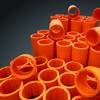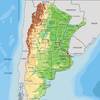On Tuesday, August 31, U.S. Customs and Border Protection Officers at the Port of Sweetgrass, MT refused entry on a shipment of Chinese porcelain vases coming from Canada which contained an unknown plant material present throughout the entire shipment.
CPB Officers used Vehicle and Cargo Inspection gamma ray technology to inspect the container, which showed an unmanifested substance inside all 83 vases. Further inspection of the material revealed three to four inches of a wheat-like substance including stems, heads, chaff and dirt inside each of the vases. CBP Officers also noted that the palletized boxes, containing the vases, were shrink-wrapped on wood slats where pieces of pallet stock were nailed together holding the boxes together within the shrink-wrap. The pallets appeared as if they had not been broken down and re-palletized after being unloaded from the shipping container, which arrived via vessel in Montreal from China.
CBP agricultural concerns regarding this shipment were raised because of the presence of wheat from China, which is prohibited in the United States due to Karnal bunt and the other smut diseases. Karnal bunt spores are highly transmissible by air and wheat that is infected by Karnal bunt is considered un-marketable due to the dark coloring of the spores and fishy aroma and flavor it gives flour milled from the infected wheat. Currently, a few counties in Arizona and Texas are currently under quarantine restrictions for Karnal bunt. Several years ago, some of the bunted wheat seed from one of these quarantine counties was found in a grain elevator in northern Montana resulting in the entire contents of the elevator having to be destroyed and the facility tarped and fumigated.
Another CBP agricultural concern with this shipment focused on the solid wood packing material from China which is prohibited unless it is accompanied by an government certificate stating that the wood has been either heat treated or fumigated to prevent Asian Longhorned Beetle, a significant pest of tress, from becoming established in the U.S.
“The presence of the wheat-like substance and the solid wood packing material both posed a high degree of pest risk to American agriculture and therefore was refused entry,” said U.S. CBP Sweetgrass Port Director Larry Overcast, “The shipment has been exported back to Canada and we will file an Emergency Action Notification citing the exporter and the importer as attempting to transport prohibited materials into the U.S.”
The shipment of vases, valued at $2,500, was heading to a private owner in the Las Vegas, NV area.
(HK Law)
Featured videos

Inside the Electrified Truckable Tug

Tracking Foreign Vessels Working in the U.S. Jones Act Market

Inmarsat Enhances Service to Drive Digitalization
Subscribe for
Maritime Reporter E-News
Maritime Reporter E-News is the maritime industry's largest circulation and most authoritative ENews Service, delivered to your Email five times per week









